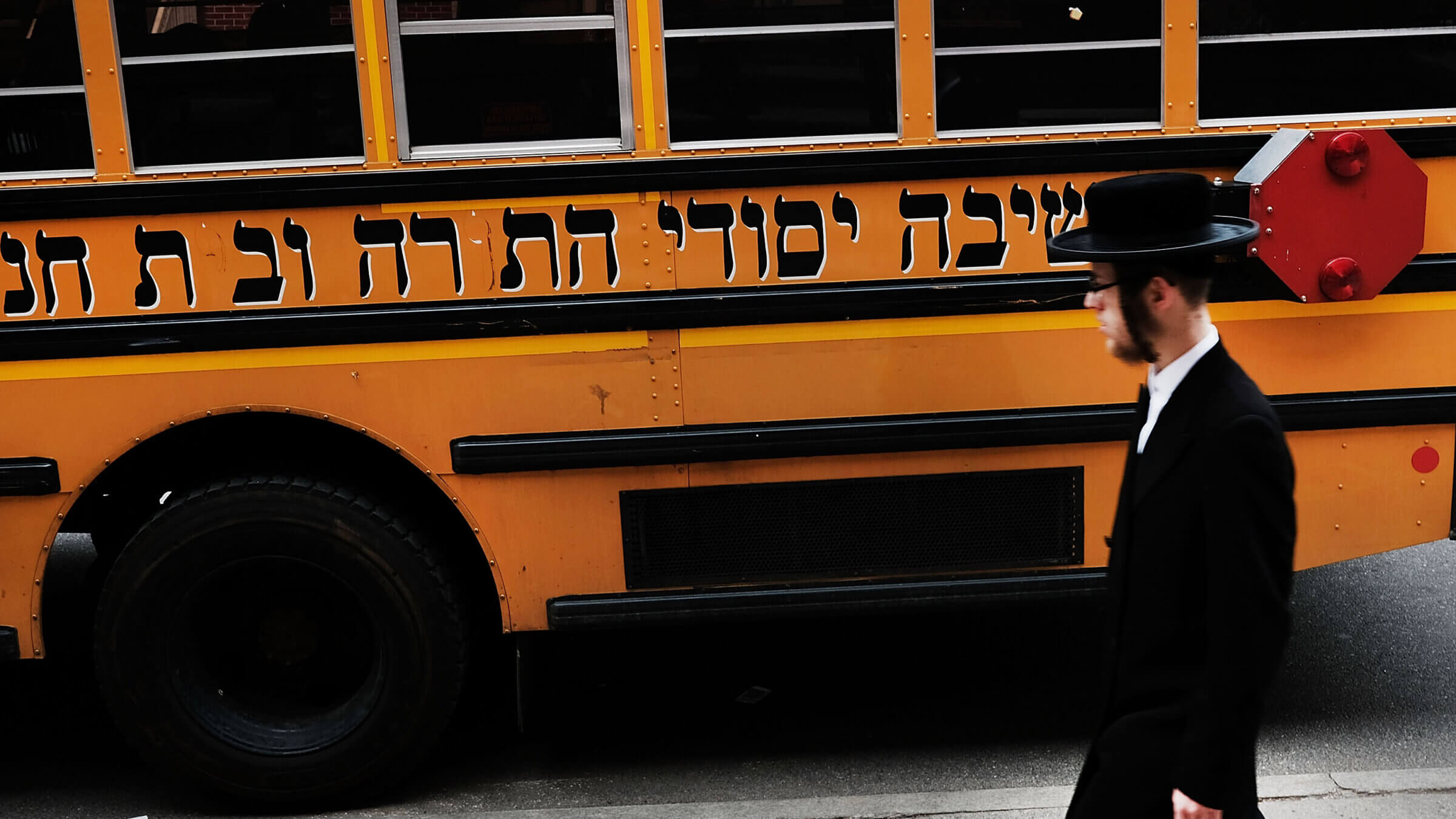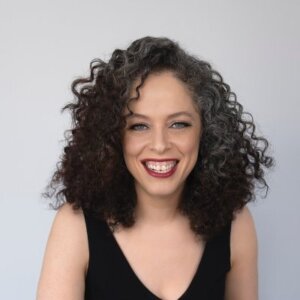Hasidic boys like mine don’t receive the education they deserve
In a scathing report, the New York Supreme Court ordered the city and state to determine whether yeshivas are providing their students with an adequate academic education.

A Hasidic man walks through a Jewish Orthodox neighborhood in Brooklyn Photo by Spencer Platt/Getty Images
In September 2019, almost 1,000 days ago, I filed a complaint with New York City and Yeshiva Mesivta Arugath Habosem, alleging that my youngest son, who was 6 years old at the time, was not receiving a secular education as required by NYS law.
The New York Supreme Court this past week finally confirmed what I’ve known all along: The Education Department is not following up on complaints that the Hasidic yeshivas are failing to provide a secular education, but instead is giving parents the runaround.
I am a mother of 10 children, six of them boys, all of whom have attended Hasidic yeshivas where they receive six hours of instruction in basic English and math a week at best, for just five of their elementary school years.
My 9-year-old son begins his school day at 8:45 a.m. with Judaic studies. His secular studies begin at 4:45 p.m. and end at 5:45 p.m. He is taught by a Yiddish-speaking young man who has not attended high school and who often relies on my son to read the harder words in the books aloud to the class.
Once my sons enter high school, they receive no secular education at all; their entire days are devoted to the study of the Talmud.
This has made finding a job very difficult for my sons. Some of my adult sons have chosen to remain in yeshiva and study the Talmud full time, and are well prepared for a life of study. However, my sons who have chosen to join the workforce have struggled terribly, as they are unable to put together a resume, fill out an application or prepare for a job interview. Sadly, the majority of jobs that are available to them are low-level, unskilled jobs.
This is the reality for the overwhelming number of men in the Hasidic community who wish to work. The idea of becoming a professional is out of reach, something they cannot even dream of, something that is seen as only for non-Jews. For all too many, going on public assistance appears to be the better option. I believe this leads to low self-esteem and frustration, but few are comfortable talking about it.
For years, despite my frustration with the lack of secular education my children were receiving, I did as women in the community are taught. I kept silent. Like in a dysfunctional family, where the focus is on hiding the dysfunction rather than addressing it, Hasidic women are taught to keep silent and not make trouble, and I obeyed.
Years before I left my marriage, I got permission from a rabbi to go to college and began to experience the benefits of an education.
The world opened up to me. I was amazed at everything that had been withheld from me. I was offered a job in the community that I could have never have gotten without the benefit of education. This reinforced to me the importance of secular studies.
When I left my marriage, I experienced incredible pushback from my family and the community. My older children were alienated from me, and my family supported my husband. This shocked me but also gave me the courage to finally speak up about my son’s educational neglect.
Confronting the authoritarian nature of my community emboldened me. I wanted my son to have every opportunity; to see the future as filled with possibilities and I was no longer willing to remain silent about something so important for his future.
In my divorce agreement, I was ordered to keep my children enrolled in the Hasidic schools that they attend. Fearful of losing custody, as many of my acquaintances who have left marriages in the ultra-Orthodox community had experienced, I agreed to the demands.
But my frustration grew, especially after seeing the struggles my adult sons were experiencing when joining the workforce.
Still, I was terrified to speak up. Growing up, I was taught that being a moser, a snitch, was tantamount to committing the worst sin. In school, we were told stories of how in Eastern Europe a moser could be ostracized or killed for their actions.
However, the illiteracy that was being inflicted upon my children — and tens of thousands like them — was indefensible. Judaism treasures learning. For Jewish leaders to withhold education from children was wrong.
First I met with the school principal, a kind-looking Hasidic man, who explained that he came in for a few hours a week to “run” the English program.
Yet when I asked him about the educational goals for my son, he had no information and explained that the yeshiva does not “do” report cards.
Later, when I asked for the schedule and curriculum, he refused to provide them. I don’t think that he was being difficult. I believe that they just don’t exist.
No curriculum.
No schedule.
No reading list.
Throughout the years, I have never received a single schedule or curriculum for any of my sons.
Not one.
Parents are expected to trust the school. Questioning can lead to a parent being labeled a troublemaker, with serious consequences such as expulsion from the school, loss of jobs in the community, and general harassment and social ostracization.
When I realized that I was not making any progress in trying to solve things within the schools themselves, my attorney David Shapiro and I filed a complaint with the city and state.
Though I knew that this was a hot political topic, I was shocked by the runaround I got. Instead of taking my complaint seriously, I was stonewalled by both the city and state. Despite promises to the contrary, the Department of Education’s investigation was never completed. I was back at square one, unable to ensure that my sons received an education.
A year ago, my attorney and I finally brought this issue to court. Last week, in a scathing report, the judge ordered the city and state to conclude their investigation within four months.
Though the city issued an ultimatum to 26 failing yeshivas in 2019, this ruling marks the first time that a judge in NY has ordered the city and state to determine whether a yeshiva is providing an academic education.
Despite this landmark ruling, there is a long road ahead until Hasidic children receive the education they deserve. My son and his peers are still spending hours in school today (and every other day) and not receiving an education. Every day this continues is intolerable.
However, I believe that the symbolic value of this ruling will catalyze holistic change.
I have been accused of being a disgruntled outsider, but the opposite is true. I speak for many Hasidic mothers and fathers who are despondent over the shoddy education their children receive. Indeed, I regularly receive messages from parents, often anonymous, thanking me for speaking up.
They thank me for being their voice, as the price they would pay for speaking up is too high.
I hope that this ruling empowers and motivates other Hasidic parents to speak up and demand better for their children without fear and that the leaders return to one of Judaism’s central teachings, that all knowledge is holy.
A message from our Publisher & CEO Rachel Fishman Feddersen

I hope you appreciated this article. Before you go, I’d like to ask you to please support the Forward’s award-winning, nonprofit journalism during this critical time.
We’ve set a goal to raise $260,000 by December 31. That’s an ambitious goal, but one that will give us the resources we need to invest in the high quality news, opinion, analysis and cultural coverage that isn’t available anywhere else.
If you feel inspired to make an impact, now is the time to give something back. Join us as a member at your most generous level.
— Rachel Fishman Feddersen, Publisher and CEO























